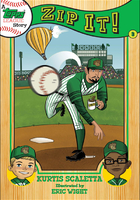THE NEXT MORNING at SeaWorld, the staff and the three trainees gathered at poolside for a demonstration by Clint Jordan, the park curator and head trainer. He began with a warm greeting to the three newcomers. "The staff and I want you to know you are very welcome in our training program." Cheers and whistles broke out from the group of trainers. "Each of you," Clint went on, "has survived a rigorous interview and background-checking process to ensure that you are in the right place. I needn't tell you that you are entering into a job that many people would love to have. In the entire world, only a handful get this opportunity. In fact, there are more astronauts than killer whale trainers.
"Let's talk about safety," said Clint. "There is an element of risk in working with these animals, especially with new people they don't know. Killer whales are the top predators in the ocean. Adult whales can reach lengths of eighteen to twenty-three feet and weigh up to twelve thousand pounds. We have guidelines and emergency procedures in case someone were to jump or fall into the pool with the whales. In our shows we have safety guidelines for the public and for our training staff. It's imperative that you follow instructions carefully as you get to know these animals.
"New trainers also need to learn all the behavior terminology so that communication between the trainers is consistent." Clint held up the whistle he wore around his neck. "For instance, the whistle is used to tell the whales yes when they've performed a particular behavior correctly. We speak of the whistle as a bridging stimulus because it bridges the time from when the animal does the correct behavior to the time the whale receives the reward such as fish, a rubdown, or a whale toy. Now I'd like to have you watch Jody demonstrate some maneuvers with her friend Kagan."
Jody, an experienced trainer Amy had watched many times in the shows, stepped to the pool edge. She gave a quick hand signal, and a giant form was suddenly racing through the water and gliding to a stop at her feet. For the next few minutes Jody put Kagan through a series of drills, carefully rewarding the animal after each performance of the desired action. From the looks on their faces, Amy saw that the trainees were in awe. Watching Kagan flawlessly obey the signals, they undoubtedly were won dering how the training of the whale had been carried out. They were about to learn the answer.
As Jody gave Kagan an appreciative rubdown, Clint again took center stage. "There are three basic rules of animal training that we try to follow at all times." He gestured to a sign on the wall by the pool that listed three steps:
1. Set the animal up for success.
2. Ignore failure and/or redirect.
3. Reward success.
Pointing to the first rule, he said, "Part of setting Kagan up for success was learning her habits, her past history, her likes and dislikes, what part of the day she has the most energy, which trainer she responds best to, and so on. Setting up for success includes eliminating any reinforcement for doing an undesirable behavior."
Pointing to rule 2, Clint commented, "You don't regard failure as a bad thing. You try to call the least amount of attention to a behavior you don't want, so as not to reinforce it. Meanwhile, you look out for success, and when it comes, you jump up and down and reinforce it like crazy.
"That leads us to rule 3," Clint continued. "Success isn't just reaching the finish line-it's in a number of small approximations, each of which needs to be observed and rewarded. In as many ways as you can, you make the animal feel good about what it's done, even if it's just a slight movement toward the target. Food, play time, toys, rubdowns-you make sure that this whale is going to associate all those good feelings with doing it right."
That evening, Amy couldn't wait to share with Matt what she had learned and see how they could apply this knowledge to Josh's bedtime issue. "Clint Jordan, our head trainer, gave us a talk today about the basics of whale training," she said. "He calls it the Whale Done method." Amy told Matt about the three basic rules of training-setting up for success, ignoring failure/redirecting, and rewarding success.
"I've been thinking about the first rule and what we might do differently to set Josh up for success," Amy continued. "One idea I have is to limit his naps, so he's sleepy in the evening. I could talk to the teachers at his day care center about keeping him more alert. If I explain why, I'm sure they'll cooperate."
Matt nodded. "Sounds good."
"We could also make sure that evening activities are quiet. No TV blaring. No running around or rambunctious play, like you and Josh have been doing," Amy continued.
Matt frowned. "I don't think the Hulk is going to appreciate us canceling wrestling matches where he defeats all opponents."
"You mean you're not going to appreciate it!" Amy chided.
Matt smiled. "On the other hand, if the Hulk and I moved our match to the early part of the evening, he would be worn out later on. Then, as you say, the later part of the evening could be calmer. I could read him a quiet story."
Amy nodded approvingly. "That covers the first rule for now," she said. "Let's talk about the second rule, ignoring failure. This, to me, is one of the biggest learnings I'm having at work. I'm in awe of the patience and persistence those trainers have in bringing the least amount of attention to what the animals do wrong. How do you think that rule might play out for us in this going-to-bed issue?"
Matt thought for a while. "Ignoring failure will be a real change for me. I guess you'd say I was 'calling attention' to our boy's not going to bed the other night! But if you and I do all we can to make sure he's sleepy and peaceful, we don't have to make a big fuss if he still doesn't cooperate. Just leave him in bed if he hollers and stay calm ourselves."
"And make no reference to his negative times," Amy added.
"Okay, good, so we ignore failure," Matt said. "The third rule says reward success. How does that work? Does it mean we make a big deal the next morning after he's gone to bed with no fuss?"
"Absolutely," Amy replied, "especially at first. We don't miss a single chance to recognize even the slightest improvement in Josh's cooperation about going to bed. This is the most powerful strategy of all. The first two rules just prepare the way for him to do something right, so we can be all over him with hugs and surprises and other things he likes. Whenever Josh goes to bed without a fuss, we make him feel really good in every way we can."
Matt shrugged. "Have to admit, it makes sense."
Amy's eyes lit up. "It's like what Clint told us today," she said. "Success isn't just reaching the finish line-it's in a number of small steps, and each step needs to be observed and rewarded. The idea is to make the animal feel good about what it's done, even if it's just moving toward the target. So success doesn't have to be perfect. We can reward in increments."
"So if Josh is good about going to bed," Matt chimed in, "we don't have to wait until morning to reward him. Each time I put him in his crib and he's peaceful, I can say, 'Daddy's proud of you for going to bed so nicely and quietly. That's really helpful to Mommy and Daddy!'"
Amy laughed. "You are really getting it, Mr. Behaviorist."
"It's worth a try," Matt said, "since nothing else we've done so far has worked!"
That evening Amy and Matt carried out each step of their plan. Nevertheless, Josh made his usual protest at bedtime. As the couple sat down in the living room, listening to the cries coming from the bedroom, Amy said, "Josh was looking sleepy this afternoon when I picked him up, so I played a game with him when we got home. He's got to be pretty tired by now, though he's fighting it.
"At SeaWorld they stress the importance of communication, so earlier today I talked to Josh about bedtime. I was very calm and picked my times when he was playing happily. I said things like, 'It's going to be fun to go to bed tonight.' Once I took him to his crib where his stuffed toys are, I said, 'Poodles and Ralph are going to be so happy to see Josh coming to sleep with them.'"
Matt nodded. "We did it all-keeping him up fairly late, making sure to eliminate any noise or strenuous activities close to bedtime." He smiled. "Then I read him his favorite story. It felt good to have him snuggling up to me."
"That bonding time is probably most important," Amy said. "When I put him in I made sure he had his friends close to him. One thing I've learned in working with the killer whales is that routines are good, but they shouldn't be too rigid. We want predictability with Josh, but we also need to vary the routine so we don't create expectations that he's going to insist on."
"I get it," Matt said. "We shouldn't always have story time be exactly fifteen minutes long. And maybe we should substitute something else for story time once in a while."
"That's it," Amy agreed.
They listened again as Josh's sounds turned to drowsy moans, then subsided to whimpers.
Matt sighed. "We haven't gone in there once. What a change from the battles we used to have! I always dreaded his bedtime, but even this first night of the new plan, I feel more in control."
"Don't forget the all-important third rule when he cooperates," Amy said. "We'll need to call attention to anything he does toward the goal of going to bed and to sleep on his own, and make a big deal about it."
Matt grinned. "I'm not going to go in there as soon as he's asleep, wake him up, and say, 'Nice job, kid.'"
Amy laughed. "No, I mean in the evenings ahead, as we keep this up, we'll need to be on our toes to praise progress. And in the times Josh really goes to bed well, we should be in there first thing the next morning telling him we're proud of him for it."
"I'm beginning to see why this stuff you're learning works," Matt said thoughtfully. "What hits me is how common it is for parents to do the thing exactly backward-to call attention to the bad stuff and ignore the good stuff. I think what we unknowingly do by those responses is train kids, employees, and even each other to do the wrong thing!"
Each evening after that, Amy and Matt continued to follow their routine to help reshape Josh's bedtime behavior. They began to see progress and were careful to celebrate each instance of it. After two weeks, Josh was making hardly any fuss about going to bed. Clearly, the hour before bedtime had become his family time, and he was enjoying being the star.
During the training period, Amy was able to arrange with Josh's day care teacher to keep him alert during nap time by allowing him some special quiet activity. It seemed the parents were covering all the bases-with one exception.
Since he was an infant, Josh had insisted that his mother be the one to tuck him in each evening. One evening Amy had to be away late attending a meeting, and it was clearly Matt's night to solo. All went well until story time ended and Matt indicated that he and Josh were headed for the bedroom. That's when the howling and fussing began. Later, when Amy returned, she found Matt exhausted and a great wailing coming from Josh's room.
"I've practically had to tie myself to the couch to keep from going in there," Matt said.
For the next several nights, both Amy and Matt put their son to bed for a few nights. Then they began to alternate. Soon it didn't matter so much who did the tucking in.
Later, when bedtime had become fun time, Amy was able one night to say to Josh, "I'll bet you could pick up all your toys before sleep time!" To his mother's delight, Josh hurried around, collecting toys and putting them away. Amy rewarded each put-away by laughing and applauding.
"Now, you're so sleepy you're ready for bed," she said when the job was done. With much praising and rewarding, this cleaning up soon became a bedtime ritual.
One evening the parents were talking about their new regimes with Josh. "Seems like you have to build backward if you started out the wrong way," Matt said one evening.
"That's right," Amy agreed. "And playing catch-up as parents is okay, as long as we know where we're going."
"Even with these Whale Done ways," Matt said worriedly, "things seem to take longer that I expect them to." He sighed. "Do you suppose we're, you know, behind some parents? Is our kid…you know…normal in the time he takes to learn these basic things?" Then he quickly added, "It's stupid to worry about these things, huh?"
Amy smiled and patted her husband's arm. "Not so much. In fact, I asked the head trainer at work about those same concerns. His answer was, 'Worry not. Compare not. Normal is what's normal for Josh.'"
Whale Done Notes
BEDTIME
Set things up for success
Establishing a bedtime routine is an effective way to calm and help your child transition from activities of the day to the quiet of the night. The routine should move from active to passive; noisy to quiet. Add a warm bath, soft music, or a special going-to-bed song, and a small glass of water so thirst is not a reason to get up. Above all, make going to bed fun. Keep the event the same, but vary its length and frequency, and make it appropriate to your child's likes and dislikes. If your child naps, make the nap early.
Ignore failure and/or redirect
Avoid calling attention to the negative by redirecting-putting attention on something for which you can praise your child. The redirection you choose must be easily doable, developmentally appropriate, and based on your child's preferences. A warm bath is a good part of the bedtime routine. If your child is hesitant, dip his hand in the water, then a foot, until he is immersed and realizing it is fun. If your child refuses to take a bath, do necessary cleaning with a washcloth, and then take one of your child's toys and start washing it in the tub, saying how nice the toy feels to be so clean. Invite your child to participate, and praise him for the help. Another example: Ask your child to dim the light in the bedroom. If he refuses, pretend to show a teddy bear how the light goes up and down in brightness. ("See, how fun this is!")
Give a Whale Done!
Reward every evidence of your child's interest, attention, or participation. For instance, when your child helps to bathe the toy, reward him with praise or a hug. When he contributes an idea or helps with establishing the going-to-bed routine, reinforce each such attitude with a Whale Done. If appropriate, keep a chart of bedtimes and wakeup times. Highlight those times that indicate success and celebrate them. When your child sleeps all night, make a big deal of it.















